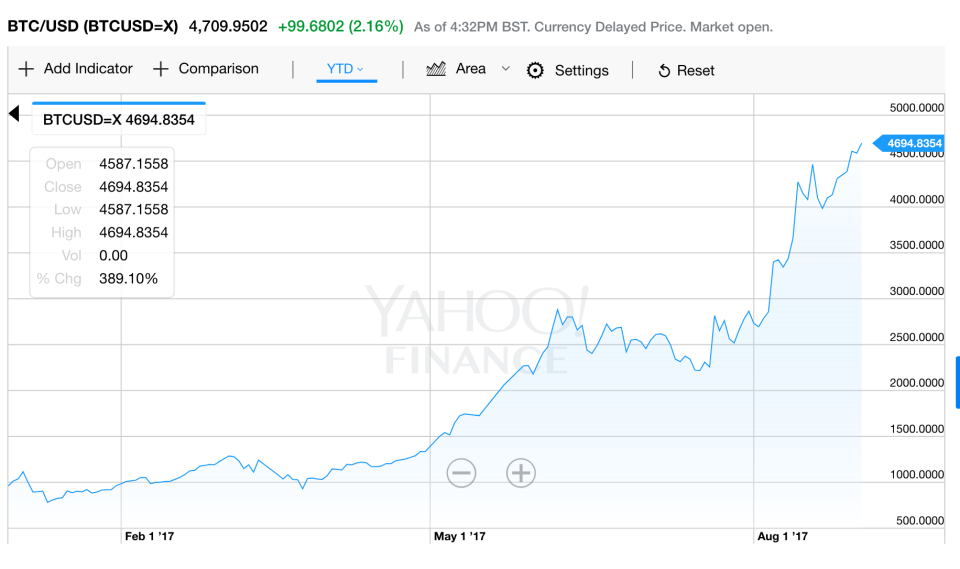How Overstock deals with bitcoin’s wild price swings
Bitcoin has always had a long history of volatility and is currently on a big upswing. For much of January, the cryptocurrency sat at under $1,000. Now, a single bitcoin is worth more than $4,610.
This volatility may be great for bitcoin investors, but the growth has hindered bitcoin’s effectiveness as a currency, as people are reluctant to spend or transact during a surge. For many, at the moment, bitcoin is largely a hedging tool or an investment.
For companies that take bitcoin as a form of payment, however, the volatility poses another challenge: dealing with accepting a currency that may change in value significantly on a daily basis. Businesses are used to dealing with fluctuating currencies, but nothing like the 385% increases that bitcoin has seen over the past few months.

In 2014 Overstock (OSTK) was the first major retailer to accept bitcoin, becoming the first billion-dollar business to take the leap. The company’s strategy was to pocket 10% of a sale in bitcoin and convert the rest into U.S. dollars. To facilitate transactions, Overstock used Coinbase’s exchange to convert digital currency in real-time.
But during the surge this year, Overstock CEO Patrick Byrne changed the online retailer’s policy in two major ways.
Overstock’s new policy: keep half
“What we do now is 50% gets turned into U.S. dollars and 50% gets held as bitcoin,” Byrne told Yahoo Finance. “So we’re accumulating that bitcoin.”
In the first week of August, Overstock announced it would be accepting nearly all major cryptocurrencies by partnering with ShapeShift, another exchange. However, alternate cryptocurrencies that the company will retain on its books will be converted into bitcoin.
Beyond holding, Byrne said the company doesn’t use any swaps or forwards or any other fancy financial instruments to hedge Overstock’s bitcoin investments.
“Just by accumulating half, that just feels like the right number for now,” Byrne said. In his view, the risk doesn’t lie as much in bitcoin but in government currency.

On its face, that might seem like a lot of bitcoin to have on its balance sheet — something shareholders in a public company may not be so comfortable with. But in reality, it’s not much: just about one-sixth of 1% (0.15% to be precise). Even if it is, however, Byrne’s policy probably won’t change.
“I think people should think about hedging risk in fiat currency,” he said. “It’s just what some government mandarin created with a pen. Why don’t they hedge risk in holding that? The risk isn’t bitcoin to the dollar. The question is why are we doing business in dollars when we could do it in bitcoin?”
Bitcoin still struggles to be a transactional currency
Byrne laments the investing-over-using mentality that the surge has engendered for the small bitcoin transaction volume on Overstock — though considering most of the population is bitcoin-illiterate, 0.15% may actually be a sizable amount.
“People just wanna hold onto it rather than spend it — they want to hoard it,” said Byrne. “You know the first bitcoin transaction? The guy who sent it gave 10,000 bitcoins for a pizza. That was a $35 million pizza [today]. So everyone’s a bit afraid to spend.”
“When Overstock decided to open its doors to bitcoin, it was charting unknown territory,” said Byrne. “It accelerated the familiarization of the cryptocurrency by years.” Byrne would love if others took a similar leap, even if on a smaller level.
“If people would start using it, it would get more liquid, more valuable,” he said. “I wish people who held bitcoin would take 10% and say ‘I am gonna spend this to stimulate the market.’”
So what’s stimulating the market now? According to Byrne, it’s not what you would expect — the biggest category that people are spending on is things like pillows and comforters. His theory? One person in the family might be bragging about success in the recent bitcoin surge and another family member says, “great, now go buy us some new things for the house.”
Ethan Wolff-Mann is a writer at Yahoo Finance focusing on consumer issues, tech, and personal finance. Follow him on Twitter @ewolffmann. Got a tip? Send to: emann@oath.com.
Read More:
The real reason Mexico will never pay for the Trump’s wall: It’d be ‘treason’
How Waffle House’s hurricane response team prepares for disaster
What bitcoin needs to do to become real currency
Trump weighs slashing one of the most popular tax deductions
A robot lawyer can fight your parking tickets and much more
Consumer watchdog is making it easier for consumers to sue banks
